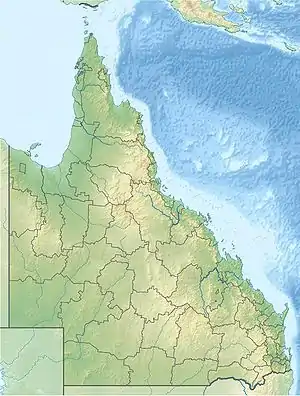Port Musgrave
Port Musgrave is a shallow, almost enclosed, estuarine bay located on the western coast of the Cape York Peninsula in Far North Queensland, Australia.
| Port Musgrave | |
|---|---|
 The south shore of Port Musgrave, near Mapoon Aboriginal Community | |
 Port Musgrave Location of Port Musgrave in Queensland | |
| Location | Far North Queensland |
| Coordinates | 11°57′11″S 141°55′26″E |
| Type | Estuarine bay |
| Etymology | In honour of Sir Anthony Musgrave |
| Part of | Port Musgrave Aggregation DIWA nationally important wetland |
| River sources |
|
| Ocean/sea sources | |
| Basin countries | Australia |
| Surface elevation | 0 m (0 ft) |
| Frozen | never |
| Settlements | Mapoon |
| References | [1] |
Geography
Two major rivers, the Wenlock and the Ducie discharge into it. The bay itself and the area surrounding it is defined as the Port Musgrave Aggregation DIWA nationally important wetland. The surrounding area is rich in freshwater swamps, while the estuary itself has tidal flats and mangroves, including stands of the Nipa Palm. It is an important breeding area for saltwater crocodiles. The small Aboriginal community of Mapoon lies on the southern shore of the bay.[2]
History
Uradhi (also known as Anggamudi, Ankamuti, Atampaya, Bawtjathi, and Lotiga) is an Australian Aboriginal language of the Western Cape York Peninsula. The traditional language region includes north of Mapoon and Duyfken Point and east of the coast strip to the north of Port Musgrave (Angkamuthi country) incorporating the mouth of the Ducie River, the lower reaches of the Dulhunty River and the upper reaches of the Skardon River in the north. Following the displacement of Indigenous people by British settlement, it was also spoken in the Northern Peninsula Area Region including the communities of New Mapoon, Injinoo and Cowal Creek.[3]
The bay was discovered by Europeans in 1887 by Hugh Milinan and Edward Cullen who named the bay in honour of Sir Anthony Musgrave,[4][5][6] at the time, the Governor of Queensland.
See also
References
- "Map of Port Musgrave, QLD". Bonzle Digital Atlas of Australia. Retrieved 11 December 2015.
- "Identification of Regional Nature Conservation Values in Cape York" (PDF). Department of Environment and Heritage Protection. Queensland Government. 2013. Archived from the original (PDF) on 22 December 2015. Retrieved 11 December 2015.
-
 This Wikipedia article incorporates CC-BY-4.0 licensed text from: "Uradhi". Queensland Aboriginal and Torres Strait Islander languages map. State Library of Queensland. Retrieved 5 February 2020.
This Wikipedia article incorporates CC-BY-4.0 licensed text from: "Uradhi". Queensland Aboriginal and Torres Strait Islander languages map. State Library of Queensland. Retrieved 5 February 2020.
- "Port Musgrave (entry 23654)". Queensland Place Names. Queensland Government. Retrieved 11 December 2015.
- McKay, Gordon R. (1981). Cullen, Edward Alexander Ernest (1861–1950). Retrieved 11 December 2015.
{{cite book}}:|work=ignored (help) - "Port Musgrave and the Batavia and Ducie Rivers". The Brisbane Courier. 2 July 1887. Retrieved 11 December 2015 – via National Library of Australia.